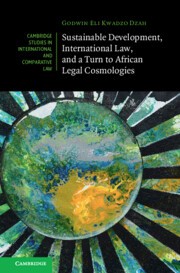Book contents
- Sustainable Development, International Law, and a Turn to African Legal Cosmologies
- Cambridge Studies in International and Comparative Law: 185
- Sustainable Development, International Law, and a Turn to African Legal Cosmologies
- Copyright page
- Dedication
- Contents
- Foreword
- Preface
- Acknowledgements
- Abbreviations
- Introduction
- Part I Mise en Scène
- Part II Universal, Pluriversal, and in Between
- Part III Thinking Alternatives
- 5 Sustainable Development and the Turn to African Legal Ontologies
- 6 Ecocosmologies, Ecolegality, and African Environmentalisms as Ecological Law
- 7 Conclusion
- Bibliography
- Index
- Cambridge Studies in International and Comparative Law
7 - Conclusion
The Paradoxical Future of Sustainable Development in International Law
from Part III - Thinking Alternatives
Published online by Cambridge University Press: 16 May 2024
- Sustainable Development, International Law, and a Turn to African Legal Cosmologies
- Cambridge Studies in International and Comparative Law: 185
- Sustainable Development, International Law, and a Turn to African Legal Cosmologies
- Copyright page
- Dedication
- Contents
- Foreword
- Preface
- Acknowledgements
- Abbreviations
- Introduction
- Part I Mise en Scène
- Part II Universal, Pluriversal, and in Between
- Part III Thinking Alternatives
- 5 Sustainable Development and the Turn to African Legal Ontologies
- 6 Ecocosmologies, Ecolegality, and African Environmentalisms as Ecological Law
- 7 Conclusion
- Bibliography
- Index
- Cambridge Studies in International and Comparative Law
Summary
This book concludes by reiterating the importance of avoiding grand narratives in research on sustainable development in international law. While each chapter revolves around its unique theme, my adoption of TWAIL helped unite these separate parts to tell a single story on Africa’s intersection with sustainable development’s legal evolution, conceptualisation, and implementation. Even so, this book is more than just writing about sustainable development or Africa as it deeply explores how international law should evolve, going forward. Finally, I end this book by drawing on TWAIL’s hopeful agenda by foreshadowing my future research interests in re-reading the law and politics of ecological crises as everyday occurrences and not as episodic events in international law.
- Type
- Chapter
- Information
- Publisher: Cambridge University PressPrint publication year: 2024

